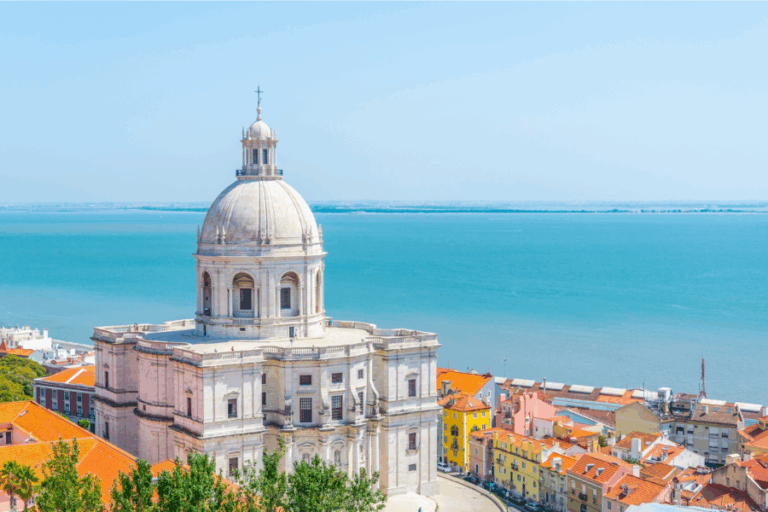- Home
- Articles
- Legal Tax Reduction
- ‘Tax the Wealthy’ Versus Legally Lowering Your Taxes
‘Tax the Wealthy’ Versus Legally Lowering Your Taxes
February 6, 2025
Nomad Capitalist has always encouraged people to go where they’re treated best – it’s been the company’s mantra from the beginning.
If you’re a wealthy person with a high income, that means you should at least consider the opportunity to legally reduce your tax rate overseas.
You can use legal offshore tax strategies to keep more of your own money. With that money, you can reinvest in your business, provide more for your family and build your legacy. But some people are too concerned with one question to ever take the leap:
‘What are the public going to think of me?’
If you leave the United States and pay fewer taxes to the government, are people going to stop liking you?
Maybe.
But maybe that’s their problem. Let’s discuss why most people seem to hate those who are more successful or wealthier than they are and why their opinions shouldn’t stop you from investing overseas, going offshore, paying fewer taxes and diversifying your assets.
The Global Movement to Tax the Wealthy
Around the world, governments are pushing harder to tax the wealthy.
In Europe, several countries are revisiting wealth taxes that had previously been abandoned.
The UK has recently announced the biggest tax increases in three decades. There have been proposals in the US to heavily tax billionaires and high-income earners (although this doesn’t look to be the case under Trump’s second term).
Meanwhile, various countries, including some in Asia and the Caribbean, are positioning themselves as tax havens, offering alternatives for those who want to protect their wealth.
Proponents of taxing the wealthy argue that it addresses income inequality and funds vital public services. They see it as a way to close the wealth gap and create a fairer society.
On the other hand, these policies could quickly stifle innovation and drive away entrepreneurs to low-tax jurisdictions. Then there’s the issue of double taxation, which penalises wealth that’s already been taxed when it was earned.
Should Wealth Be Punished?
The question boils down to whether wealth accumulation is inherently bad or evil.
Of course it isn’t.
Some view wealth as a resource that can fuel innovation and create jobs. Others see it as an unfair advantage that widens social divides.
Those who relocate to avoid wealth taxes are often criticised, but it’s important to weigh the ethics of this choice.
Is it wrong to prioritise your family’s future and financial stability? Is it a bad thing to maintain the wealth you’ve worked so hard to achieve?
Plus, many wealthy individuals already contribute through philanthropy and investments that boost economies.
Ultimately, as a wealthy individual, you have options available to legally hold onto more of your own wealth (which is rightfully yours).
Whether you feel that’s right or wrong is up to you, but there’s always the option to do it and go where you’re treated best.

The Case for Legal Tax Strategies over High Taxes
Legal tax strategies are not only ethical but also beneficial for economies.
By optimising taxes, wealthy individuals reinvest in businesses, create jobs and fuel growth.
This is different from tax evasion, which is both illegal and unethical.
For example, setting up an offshore business in a low-tax country or using international tax treaties can significantly lower your tax bill. These strategies comply with the law and enable you to allocate resources more efficiently.
Unlike evasion, optimisation works within the system to achieve better outcomes for everyone.
Why People Hate the Wealthy
Some years ago, during the pandemic, the conversation around the ‘trend’ of hating the wealthy re-opened.
An interesting article by Vicky Ward discussed how the COVID-19 crisis affected the wealthy differently than the average American citizen.
Ward has written books in the past on ‘corruption among the country’s wealthiest 1%’ and ‘Wall Street greed’ in which she bashes the wealthy. She has spoken out on the supposed unfair privileges of the wealthy in multiple articles.
However, in this particular article, Ward explains that she feels the wealthy have an unfair advantage.
The wealthy were able to escape the coronavirus pandemic in some ways by distancing themselves and leaving for their large houses farther away from the city to less populated places, while others in New York City are stuck in an area where they have more of a chance of being infected.
What Ward didn’t address was the decisions that the wealthy had made to get them where they were. And once they gained their wealth, they chose to financially strategise in order to have a backup plan.
Not everyone does that – not even all those with money.
People who have multiple assets, multiple houses, and multiple options for where they can go in a time of crisis have these things because they have diversified their assets to protect themselves and their investments.
The wealth that they have earned is an insurance policy that these entrepreneurs, investors and businessmen have been working to build for years.
Ward went on to accuse the wealthy of being ruthless and greedy in order to get ahead. However, what Ward sees as ‘greed’ can be seen as using good business sense in a competitive market.
Successful people know that they aren’t going to progress in life – and in their finances – if they let other people take their business. That wouldn’t make any sense.
The majority of millionaires in the United States – more than seven out of ten – did not inherit their money. They’ve gotten to where they are with hard work and smart decisions.
But that doesn’t seem to matter to people who share Vicky Ward’s opinions.
Many people seem to have a personal gripe against the wealthy. These are the people who are angry and jealous because they don’t know how to be successful or haven’t put in the work. They haven’t innovated because they expect to get by in the world the same way that generations before them did.
But that isn’t working anymore.
These people are motivated by anger and jealousy to hate anyone who is more successful or wealthier than they are.
Because they have not created the option for themselves to leave where they are and go to a second house or another country where they have a second citizenship, they hate those who can.
This jealousy is going to cloud any sound judgment they might have, so we wouldn’t make them a primary source of validation.
Biting the Hand that Feeds
While we’re on the topic of hating the wealthy during the pandemic, another example of the toxic public attitude toward wealth became painfully clear when Twitter users lashed out at Jack Dorsey, co-founder of Twitter and CEO of Square.
It was essentially biting the hand that feeds them when he pledged one billion dollars to help fund COVID-19 relief.
He gave away 28% of his net worth but they were mad about it.
On Twitter – the platform that Dorsey created so that everyone can have a voice – people criticised him, saying that the donation wasn’t enough because it wouldn’t have any significant impact on his finances or change his lifestyle.
They didn’t want his donation if it wasn’t going to hurt him financially and change his wealth status.
Other people, in their righteous anger, accused Dorsey of just making this donation for PR. Because they seem to assume that the only reason an ‘evil’ and ‘corrupt’ wealthy person would donate to any cause would be to make themselves look good.
These people in the Twitter comments seemed to forget (or not care) that this was the guy who created Twitter – the very platform that they used to complain on – in order to give these people their voice and an online presence.
This is the guy who created Square, which has allowed small business owners to collect payments, creating a more democratic system that has pushed business and entrepreneurship forward in a way that makes it easier for everyone.
People seem to forget the positive contributions that Dorsey and other self-made millionaires and billionaires have made, reducing them to nothing more than their ‘corrupt’ wealth.
Again, we wouldn’t make these kinds of people your main source of validation.
A Wealth Tax Punishes Innovation
Money is not inherently evil or corrupt, though the people in Dorsey’s Twitter comments may argue differently.
Most millionaires in the United States have earned their wealth through years of hard work and smart business strategy. They earned it through contributing value to the market and the world.
This is not a zero-sum game. Because the free market is made for competition, people have the opportunity to innovate and create something new that they can contribute to the market. And this innovation should be rewarded.
Should we punish someone for innovating, creating and working hard?
Implementing a wealth tax or applying higher income taxes on the wealthy punishes them for the valuable contributions they have made. Taking their pay away from them is devaluing their worth.
There are people in the world who want to raise taxes and put high taxes on the wealthy, not because they want to use this money to help their social causes but because they believe that billionaires should not exist.
We’ve spoken to people who lived in countries where everyone made the same salary. A hardworking, innovative CEO who had made contributions that helped hundreds of thousands of people would be paid the same as a bus driver.
These systems did not care how valuable your contributions were. They just didn’t want you to make more money than anyone else.
These systems didn’t work.
How to Reduce Taxes Legally
The risk of wealth taxes may be increasing, but that doesn’t mean you have no way of escaping these taxes.
Through smart planning, it’s possible to legally reduce or even eliminate your taxes as a wealthy individual. Generally, this involves leveraging global opportunities.
Moving offshore is one popular way. Many countries only tax income earned within their borders, so relocating to a nation with a territorial tax system can significantly reduce your tax burden.
For example, if you live in a country like Malaysia, you may only pay taxes on locally sourced income, leaving your foreign earnings untouched.
Another option is to live in a tax haven. Places like Monaco, Dubai or the Cayman Islands offer zero or very low-income taxes. This isn’t just for billionaires – many professionals, remote workers and entrepreneurs find these locations appealing.
Just be prepared to genuinely move there and meet residency requirements to avoid complications.
As a US citizen, you can take advantage of the Foreign Earned Income Exclusion (FEIE) by spending at least 330 days a year outside the United States. This allows you to exclude a substantial portion of your income – up to US$130,000 in 2025 – from US taxes.
If you want to stay closer to home, you could consider relocating to a US territory like Puerto Rico.
Programs like Act 602 offer extremely low tax rates for businesses and investors, but you must live there for at least 183 days a year and make Puerto Rico your primary tax home.
Each strategy has specific rules and requirements, so working with a tax advisor experienced in international planning is essential. We can help.
Tax the Wealthy Versus Legally Lowering Your Taxes: FAQs
The wealthy often use legal tax strategies such as establishing offshore businesses, relocating to tax-friendly jurisdictions and taking advantage of tax treaties or exemptions. These methods optimise their tax obligations while staying compliant with the law.
While exact figures vary, wealthy individuals do typically pay a significant amount in taxes due to higher income tax brackets and capital gains taxes. However, effective planning can greatly reduce their overall tax burden compared to nominal rates.
Legally reducing tax obligations involves strategies like moving to countries with territorial tax systems, setting up offshore businesses or leveraging deductions and credits available in your tax jurisdiction. Working with a knowledgeable tax advisor ensures compliance.
Yes, US citizens can use tools like the Foreign Earned Income Exclusion, relocate to tax-friendly US territories like Puerto Rico or invest in tax-advantaged accounts. International strategies like living in a tax haven or establishing offshore entities can also be effective. However, the only way to truly escape the US tax system is to renounce your citizenship.
Go Where You’re Treated Best
Why should the wealthy stay in a place that punishes them for their contributions?
Today, more and more countries in Asia, Latin America and Eastern Europe – countries with lower taxes than the US tax system – are opening up to investors and new citizens.
These are countries that want you there. They’re opening up their markets to your business. Their economies are growing, and more people are moving to compete.
You have the option to move somewhere better – to an emerging market with new and better opportunities. Why not take them? No matter what you do, people are going to be angry with you. Why not go where you’re treated best?
If you no longer feel welcome in your Western country because of the number of people complaining about the wealthy and the 1% – the people who are going to hate you no matter what you do – you’re not obligated to stay where you are.
As a wealthy person, you have the option to go offshore, to make investments and bank overseas, to obtain a second or even third citizenship and to legally lower your taxes.
By lowering your tax rate, you’re going to have more money on hand to make significant donations, like Dorsey did. Who cares if people in the West hate you for it if you know that you’re making a difference?
There are other countries in the world that want your business. They want you to bring in your money and your talents. And they just might love you for it.
This could be an opportunity for you to move to a country where you’ll pay fewer taxes and keep more of the money that you’ve earned.
By moving to a better place, you’re going to have better taxes, better friends and a better lifestyle. There’s nothing ethically wrong in going to a place where the rules are more in your favour.
We live in a world where you can’t possibly make everyone happy. But you can start by prioritising what you think is best – what will benefit your life – and disregarding the things the naysayers in this world are going to tell you.
At Nomad Capitalist, we help wealthy investors and entrepreneurs to ‘go where they’re treated best’, whether that’s by moving your investment offshore or relocating to a tax-friendly country.
Our clients are paired with experts in tax, investment strategy, asset protection and immigration. Click to learn more about our holistic Nomad Capitalist plans.


Portugal Taxes for U.S. Expats: An In-Depth 2025 Guide
As an American living in Portugal, you can enjoy the country’s favorable tax system with many incentives, but you must also balance your obligations with those in the U.S. This two-pronged tax landscape can be confusing and lead to inadequate tax planning. To clear the air and share crucial information you should know about Portugal […]
Read more

A Concise Guide to Portugal’s Wealth Tax
For high-net-worth individuals, the tax environment of their country of residence is among the most important considerations. If you plan on relocating, it should be to a country that won’t cause wealth deterioration through heavy taxation. Fortunately, Portugal is among such countries. The taxation system is favorable for expats, including those with significant wealth. In […]
Read more

Does Puerto Rico Pay Taxes to the US?
It’s a common question and one that often fuels confusion, debate, and a fair share of misinformation – Do residents of Puerto Rico actually pay US federal taxes? When most people think of US tax obligations, they naturally assume they apply uniformly across all US citizens. But when it comes to Puerto Rico, things are […]
Read more




